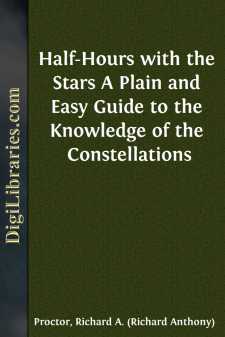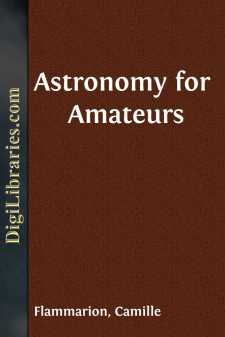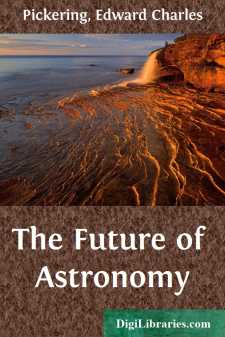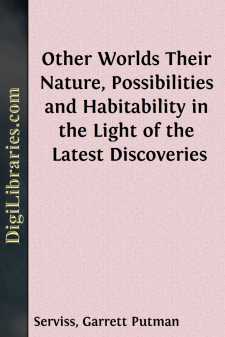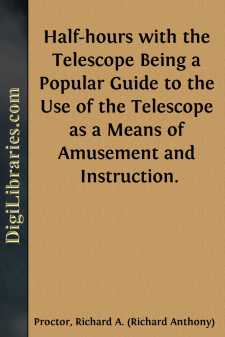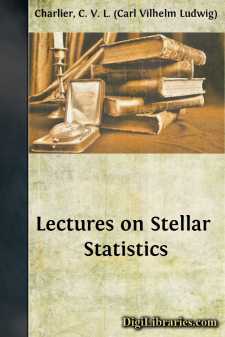Science
- Astronomy
- Biology 40
- Chemistry 13
- Electricity 1
- General 38
- History 6
- Light 1
- Paleontology 2
- Philosophy & Social Aspects 1
- Physics 3
- Relativity 2
- Study & Teaching 1
- Waves & Wave Mechanics 1
Astronomy Books
Sort by:
CHAPTER I. INTRODUCTORY. The Sun. The sun's position in the great field of energy is daily becoming more exalted in the estimation of philosophic minds. His labors are being revealed to us with a distinctness never before conceived. He it is that stored the coal in the bosom of the earth, and piled up the polar ice. He it is that aids the chemist, drives the engine, ripens the harvest, dispenses...
more...
It is very easy to gain a knowledge of the stars, if the learner sets to work in the proper manner. But he commonly meets with a difficulty at the outset of his task. He provides himself with a set of the ordinary star-maps, and then finds himself at a loss how to make use of them. Such maps tell him nothing of the position of the constellations on the sky. If he happen to recognize a constellation,...
more...
INTRODUCTION The Science of Astronomy is sublime and beautiful. Noble, elevating, consoling, divine, it gives us wings, and bears us through Infinitude. In these ethereal regions all is pure, luminous, and splendid. Dreams of the Ideal, even of the Inaccessible, weave their subtle spells upon us. The imagination soars aloft, and aspires to the sources of Eternal Beauty. What greater delight can be...
more...
THE FUTURE OF ASTRONOMY BY PROFESSOR EDWARD C. PICKERING HARVARD COLLEGE OBSERVATORY It is claimed by astronomers that their science is not only the oldest, but that it is the most highly developed of the sciences. Indeed it should be so, since no other science has ever received such support from royalty, from the state and from the private individual. However this may be, there is no doubt that in...
more...
CHAPTER I Other worlds and their inhabitants are remarkably popular subjects of speculation at the present time. Every day we hear people asking one another if it is true that we shall soon be able to communicate with some of the far-off globes, such as Mars, that circle in company with our earth about the sun. One of the masters of practical electrical science in our time has suggested that the...
more...
CHAPTER I. A HALF-HOUR ON THE STRUCTURE OF THE TELESCOPE. There are few instruments which yield more pleasure and instruction than the Telescope. Even a small telescope—only an inch and a half or two inches, perhaps, in aperture—will serve to supply profitable amusement to those who know how to apply its powers. I have often seen with pleasure the surprise with which the performance even of an...
more...
CHAPTER I. APPARENT ATTRIBUTES OF THE STARS. 1. Our knowledge of the stars is based on their apparent attributes, obtained from the astronomical observations. The object of astronomy is to deduce herefrom the real or absolute attributes of the stars, which are their position in space, their movement, and their physical nature. The apparent attributes of the stars are studied by the aid of their...
more...
by:
Edward Everett
TWO NEW INSTITUTIONS OF SCIENCE; THE SCENES WHICH ATTENDED THEIR CHRISTENING. In the month of August last, two events took place in the city of Albany, which have more than an ephemeral interest. They occurred in close connection with the proceedings of a Scientific Convention, and the memory of them deserves to be cherished as a recollection of the easy way in which Science may be popularized and be...
more...
THE NEW HEAVENS Go out under the open sky, on a clear and moon-less night, and try to count the stars. If your station lies well beyond the glare of cities, which is often strong enough to conceal all but the brighter objects, you will find the task a difficult one. Ranging through the six magnitudes of the Greek astronomers, from the brilliant Sirius to the faintest perceptible points of light, the...
more...
THE DIAGRAMS. The diagrams, it will be observed, are grouped under the seasons, and they indicate the positions of the constellations as they appear at 9 o'clock p.m. in mid-season. To facilitate finding and observing the constellations, the student should face in the direction indicated in the text. This applies to all constellations excepting those near the zenith. The four large plates are so...
more...



